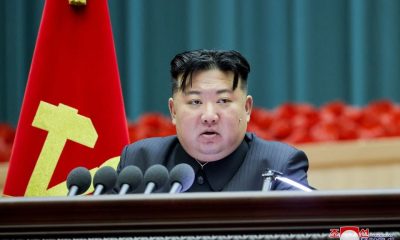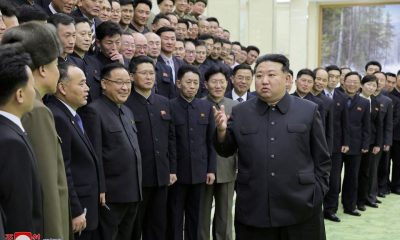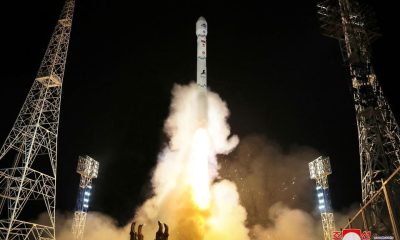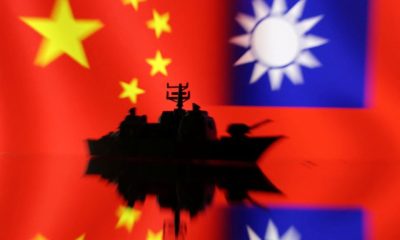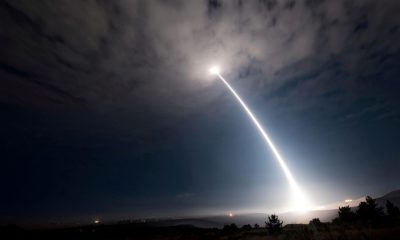AFRICA
Change in North Korean Policy Could Catalyze Restructuring of the International Stage
It appears as though there is a detente of sorts developing between North and South
Korea. This collaboration of the Koreas comes in lieu of the tension-filled past year in which the
People’s Republic of Korea has made concentrated efforts to bolster both their ICBM and
nuclear arsenals. As part of this newly constructed relationship, high ranking officials from North
and South Korea are set to meet on the North Korean side of the “truce village” of Panmunjom to
discuss the agenda and talking points of an upcoming meeting between President Moon Jae-in of
South Korea and leader of North Korea Kim Jong-un. The delegation of South Korea will be led
by the Unification Minister Cho Myoung-gyon while the North Korean delegation will be led by
Ri Son-kwon. Ri Son-kwon is a high ranking senior advisor to Kim Jong-un who visited South
Korea during their hosting of the Olympic games last month. This visit was made with the
purpose of strengthening this newly formed collaborative relationship between the two
historically combative states.
One of the chief concerns regarding the relationship between the Koreas has been the
emboldened effort to build up a nuclear and intercontinental ballistic missile arsenal by DPRK.
While Kim Jong-un and his administration have been known to inflate and exacerbate
information, it is clear from the various nuclear tests conducted by North Korea that they, at
minimum, possess weapons with nuclear capability. However, what does this arsenal look like,
and what kind of capabilities does it possibly possess? North Korea has conducted a total of five
nuclear tests. In order to launch a legitimate nuclear attack on an enemy, North Korea must have
the capability of sizing down these nuclear warheads so that they could fit onto a missile. While
it was widely believed that they did not have this capability, leaked information to the
Washington Post in 2017 revealed that North Korea was indeed already capable of this process of
“miniaturization”. In regards to the magnitude of the tests being conducted, the nuclear bombs
appear to be consistently increasing in strength. Their strongest test was in September of 2016,
where the device launched produced an explosion between the range of ten and thirty kilotonnes.
For reference, the atomic bomb dropped on Hiroshima by the U.S at the conclusion of World
War II was thirteen kilotonnes. Another key detail of the test in September of 2016 is that it was
a hydrogen bomb being tested, rather than atomic bombs which were tested previously.
Hydrogen bombs are created on the basis of merging atoms to create a powerful explosion, in
contrast to atomic bombs that utilize nuclear fission. While some critics doubt the fact that it was
a hydrogen bomb based on the blast radius, the implications are still worrisome.
This nuclear arsenal and the uncertain motives behind its buildup are obvious signs of
concern, which is a key reason as to why the U.S is particularly interested in meeting with the
controversial leader. Luckily, to the U.S’s surprise North Korean leader Kim Jong-un requested a
meeting with President Trump. If this meeting were to occur, it would be the first time a standing
U.S president met with a North Korean leader, as the U.S is still technically at war with North
Korea because the Korean war was halted in 1953 due to a truce, rather than a formal treaty. This
meeting has been viewed by many as vital to national security because Kim Jong-un has been
quoted as saying that he would be willing to denuclearize his arsenal, and even halt all nuclear
and ICBM tests while the negotiations are in progress. Until this point, Mr. Kim has been
consistent in the stance that North Korea’s nuclear program would not be used as a bargaining
chip, however, it seems as though now he could choose to denuclearize if given security
guarantees from the U.S.
This sudden willingness to construct a positive relationship with South Korea coupled with a
desire to receive security from the U.S in exchange for denuclearization is in stark contrast with
the traditional North Korean strategy. Some see this as controversial and possibly a ploy. Critics
have hypothesized that Mr. Kim is simply attempting to ease the sanctions imposed on North
Korea in order to grant them more time and capital to contribute to their nuclear and ICBM
agenda. While this could possibly be true and should be handled with precaution, this new North
Korean attitude is a breath of fresh air to the international community and could quite possibly
lead to resolution of one of the tensest conflicts on the global stage today.
AFRICA
The UK paid Rwanda an additional $126 million for the contested migrant plan.
As the tab for Britain’s controversial proposal to relocate asylum seekers to the East African nation continues to increase, the United Kingdom paid Rwanda an extra 100 million pounds ($126 million) in April. This was in addition to the 140 million pounds it had already provided Rwanda.
Even though the Rwanda project is at the core of the policy that British Prime Minister Rishi Sunak is employing to discourage illegal immigration, there have been no individuals sent to Rwanda as of yet due to legal challenges that have taken place since the initiative was introduced in 2022.
After Sunak’s immigration minister resigned this week, the polarizing policy is now regarded as a danger to Sunak’s leadership, which is anticipated to be challenged in the election that will take place the following year.
According to a letter that the British Ministry of the Interior issued on Thursday, the United Kingdom plans to give Rwanda fifty million pounds in addition to the 240 million pounds it has already provided to the East African nation.
The opposition Labour Party criticized the disclosures regarding the rising cost of a scheme that legal experts warned could collapse. Some parliamentarians within Sunak’s party are also expected to express their disapproval of the idea.
A statement by Yvette Cooper, the shadow interior minister for the Labour Party, on social networking site X, said, “Britain cannot afford more of this costly Tory chaos and farce.”
On Friday, however, the newly appointed minister for legal migration, Tom Pursglove, explained what he called the “investment” of 240 million pounds. He stated that once the Rwanda policy was operational, it would reduce the money spent on hosting asylum-seekers in the United Kingdom.
“When you consider that we are unacceptably spending 8 million pounds a day in the asylum system at the moment, it is a key part of our strategy to bring those costs down,” Pursglove explained to Sky News.
Pursglove stated that the money donated to Rwanda would assist in the country’s economic growth and help get the asylum relationship with the United Kingdom up and running.
There was no connection between the money sent to Rwanda and the treaty that the two nations signed on Tuesday, according to the letter from the Ministry of the Interior.
The treaty aims to respond to a ruling by the Supreme Court of the United Kingdom, which stated that the deportation plan would contravene local laws based on international human rights standards.
“The Government of Rwanda did not ask for any payment in order for a Treaty to be signed, nor was any offered,” according to the correspondence.
After Robert Jenrick resigned from his position as immigration minister on Wednesday, Sunak made a plea to fellow Conservative parliamentarians on Thursday to come together in support of his Rwanda proposal. He stated that the emergency legislation the government had drafted to get the scheme up and running did not go far enough.
Africa
UK interior minister travels to Rwanda to resurrect asylum plan.
On Tuesday, the Minister of the Interior of the United Kingdom, James Cleverly, came to Rwanda to sign a new treaty. This was done to circumvent a court judgment that blocked the government’s contentious policy of transferring asylum seekers to the East African nation.
The Rwandan plan is at the core of the government’s attempt to reduce migration, and it is being closely monitored by other nations who are considered to be considering policies that are comparable to Rwanda’s.
In a decision handed down a month ago, the Supreme Court of the United Kingdom stated that such a move would violate international human rights norms embedded in domestic legislation.
Following the decision, the United Kingdom has been making efforts to revise its agreement with Rwanda to incorporate a legally binding treaty that guarantees Rwanda would not remove asylum seekers brought there by the United Kingdom. This is one of the primary concerns of the court.
Several attorneys and charitable organizations have said that it is highly improbable that deportation flights will begin before the election. With a lead of more than ten percentage points in the polls, the opposition Labour Party intends to abandon the Rwanda policy if it is victorious.
A meeting between Cleverly, who arrived in Kigali, the capital of Rwanda, on Tuesday morning, and Vincent Biruta, the country’s Minister of Foreign Affairs, is scheduled to take place to sign the agreement.
“Rwanda cares deeply about the rights of refugees, and I look forward to meeting with counterparts to sign this agreement and further discuss how we work together to tackle the global challenge of illegal migration,” Cleverly says.
The United Kingdom aims to transfer thousands of asylum seekers who came to its beaches without authorization to Rwanda under the plan that was agreed upon the previous year. This discourages migrants from crossing the Channel from Europe in tiny boats.
In exchange, Rwanda has been given an initial payment of 140 million pounds, equivalent to 180 million dollars, along with the promise of additional funds to cover the costs of housing and medical treatment for any deported persons.
THE PRESSURE
A great deal of pressure is being put on Prime Minister Rishi Sunak to reduce net migration, which reached a record high of 745 thousand people in the previous year, with the vast majority of migrants entering through legal channels.
“Stop the boats” is one of the five goals that Sunak has set for his government. The influx of asylum seekers who pay people smugglers for their crossings of the Channel, which frequently take place in boats that are overloaded and not seaworthy, is one of the aims that Sunak has set.
The Supreme Court determined that the Rwanda plan should not be implemented because there was a possibility that refugees who were deported would have their claims incorrectly evaluated or that they would be sent back to their country of origin to suffer persecution.
In the latter part of this week, it is anticipated that the new treaty will be followed by the release of legislation declaring Rwanda a so-called safe nation. This law is intended to prevent legal challenges against the planned deportation flights.
Despite this, this will probably result in a fresh set of political and legal difficulties.
An immigration attorney at Harbottle & Lewis named Sarah Gogan stated that the government’s policy will be challenged due to Rwanda’s history of violations of human rights provisions.
“Rwanda is an unsafe country and this is not a quick fix,” added the politician. “You cannot in a matter of weeks or months reform a country and turn it into one with an impartial judiciary and administrative culture.”
Another “gimmick” was what Yvette Cooper, the spokesperson for the Labour Party’s home affairs department, called the most recent measures proposed by the administration.
Whether or not to design the law in a way that would avoid subsequent legal challenges is still up for debate by the administration.
Several members of the Conservative Party in parliament are putting pressure on the government to incorporate a “notwithstanding” clause into Rwanda’s policy. This clause would disapprove the domestic and international human rights commitments of the United Kingdom regarding Rwanda.
However, some politicians within the ruling party, such as Robert Buckland, have stated that such a move would be “foolish” and undermine the Good Friday Agreement, which is primarily responsible for ending three decades of carnage in Northern Ireland. This is because the European Convention on Human Rights supports the treaty.
Africa
Madagascar leader wins presidential vote, constitutional court says
On Friday, the High Constitutional Court of Madagascar certified Andry Rajoelina, the current President of Madagascar, to be the victor of the election a month ago, essentially granting him a third term in office.
Following the dismissal of several challenges submitted against the preliminary results by the electoral board, the court said that Rajoelina collected 58.96% of the votes that were cast.
Florent Rakotoarisoa, the chairman of the High constitutional court, stated that “Andry Rajoelina is elected as the president of the republic of Madagascar and is taking his functions as soon as the swearing (is conducted) comes to an end.”
The rejected challenge was submitted by the politician Siteny Randrianasoloniaiko, who received 14.39% of the vote, according to the court. This was one of the challenges that was denied.
Ten of the thirteen candidates chose not to participate in the election; nevertheless, their names were already on the ballot, so they could still divide the remaining votes. The court reported that the turnout was 46.35 percent.
The election on November 16 was preceded by weeks of demonstrations, during which the opposition accused Rajoelina of having fostered conditions that were unjust to the election.
The charges that the vote was rigged have been refuted by Rajoelina, and the army has issued a warning against any attempts to destabilize the country.
As far as the opposition is concerned, the voter turnout for the election was the lowest it has ever been in the country’s history.
Hajo Andrianainarivelo, a former minister who was one of the candidates who chose to abstain from voting, has committed to fight against what he has described as a lack of respect for the rules of the state and the tyranny of the people.
“The popular fight begins now,” he declared on Thursday referring to the ongoing conflict.
Rajoelina, now 49 years old, initially won power in a coup in 2009. After resigning from his position as the head of a transitional authority in 2014, he went on to win another election in 2018 and regain his position as president.
-

 Geopolitics & Foreign Policy3 months ago
Geopolitics & Foreign Policy3 months agoTurkey’s Erdogan says he may visit Egypt soon, discuss Gaza patients -media.
-

 Europe3 months ago
Europe3 months agoRussia’s Shoigu accuses the West of seeking to expand the Ukraine war to the Asia-Pacific.
-

 Geopolitics & Foreign Policy3 months ago
Geopolitics & Foreign Policy3 months agoCeasefire takes hold in Gaza ahead of hostage release; aid enters enclave.
-

 Geopolitics & Foreign Policy3 months ago
Geopolitics & Foreign Policy3 months agoRussia deploys new nuclear missile in Kaluga region – RIA
-

 America4 months ago
America4 months agoRepublican US House to hold first Biden impeachment inquiry hearing
-

 Geopolitics & Foreign Policy2 months ago
Geopolitics & Foreign Policy2 months agoChina’s military: US Navy ship ‘illegally’ entered territorial waters
-

 Europe4 months ago
Europe4 months agoZelenskiy, at NATO HQ, asks for weapons to face winter of ‘terror’
-

 Global Issues & Cooperation5 months ago
Global Issues & Cooperation5 months agoHuman rights in Russia have ‘significantly deteriorated’ – UN expert.


